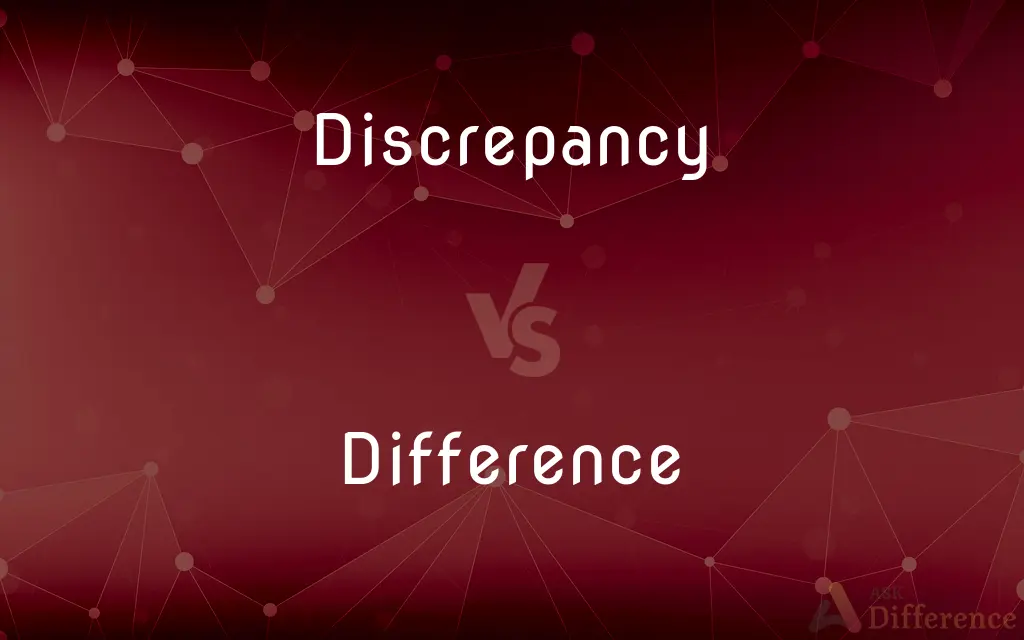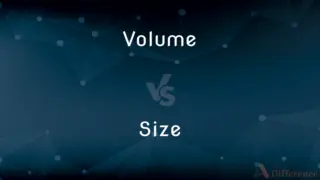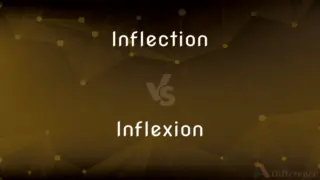Discrepancy vs. Difference — What's the Difference?
Edited by Tayyaba Rehman — By Maham Liaqat — Updated on April 3, 2024
Discrepancy implies inconsistency or a lack of agreement between facts or figures, while difference refers to the state of being unlike or distinct in nature, form, or quality.

Difference Between Discrepancy and Difference
Table of Contents
ADVERTISEMENT
Key Differences
Discrepancy often carries a connotation of an unexpected or problematic inconsistency, particularly in contexts where exact matches are anticipated, such as in financial accounts or data comparisons. On the other hand, a difference is a broader term that simply denotes any form of dissimilarity between two or more things or people, without inherently implying an error or issue.
In legal and formal documents, a discrepancy might suggest a potential error or misalignment that needs resolution, indicating something amiss that could have serious implications. Whereas, identifying a difference in such documents might merely acknowledge the distinct characteristics or provisions without suggesting a mistake.
When discussing observations or results, mentioning a discrepancy often hints at a deviation from what was predicted or expected, potentially signaling a deeper issue or the need for further investigation. In contrast, noting a difference between observations or results might just be pointing out variations without any underlying concern for accuracy or correctness.
In the realm of mathematics or science, a discrepancy could refer to an unexplained or significant deviation from a theoretical prediction, requiring an explanation. Conversely, a difference in this context could simply refer to the result of a subtraction operation or a comparative analysis between two figures, values, or sets of data, not necessarily indicating an error.
In everyday language, a discrepancy is more likely used when things don’t add up as they should, raising eyebrows or questions. Difference, however, is a much more commonly used term that applies to any situation where things aren’t the same, often used neutrally without implying any problems.
ADVERTISEMENT
Comparison Chart
Connotation
Implies inconsistency or error.
Neutral; denotes dissimilarity.
Context
Often used where precision is expected, e.g., finance, law.
Broadly used in various contexts to denote unlikeness.
Implication
Suggests a need for correction or investigation.
Simply notes a variance, without implying a mistake.
Use in Documents
Indicates potential errors or misalignments.
Acknowledges distinct characteristics without suggesting issues.
Importance
May signal a significant problem or oversight.
Indicates variation or diversity, often without negative connotations.
Example in Science
Deviation from theoretical prediction needing explanation.
Comparative analysis or the result of a subtraction operation.
Everyday Usage
Used when things don’t add up or match expected outcomes.
Used to describe any form of non-identity or variation.
Compare with Definitions
Discrepancy
Financial Records.
The auditor found a discrepancy in the company’s expense reports.
Difference
Personal Preferences.
The difference in their music tastes was quite apparent.
Discrepancy
Data Accuracy.
A discrepancy in the experimental data led to further review.
Difference
Comparative Analysis.
The study highlighted the difference in growth rates.
Discrepancy
Legal Testimony.
Discrepancies in witness testimonies can undermine a case.
Difference
Cultural Diversity.
Celebrating the difference between cultures enriches society.
Discrepancy
Quality Control.
Any discrepancy in product quality triggers a thorough inspection.
Difference
Opinion Variation.
The discussion revealed a significant difference of opinion.
Discrepancy
Measurement Error.
The discrepancy between the two measurements was concerning.
Difference
Mathematical Result.
The difference between the two numbers is five.
Discrepancy
An illogical or surprising lack of compatibility or similarity between two or more facts
There's a discrepancy between your account and his
Difference
The quality or condition of being unlike or dissimilar.
Discrepancy
Divergence or disagreement, as between facts or claims; difference.
Difference
An instance of disparity or unlikeness
There is a big difference in sound between a clarinet and an oboe.
Discrepancy
An instance of divergence or disagreement.
Difference
A degree or amount by which things differ
A difference in height of three inches.
Discrepancy
An inconsistency between facts or sentiments.
They found a discrepancy between the first set of test results and the second, and they're still trying to figure out why.
Difference
A noticeable change or effect
Exercise has made a difference in her health.
Discrepancy
The state or quality of being discrepant.
Difference
A disagreement or controversy
Let's settle our differences.
Discrepancy
A difference between conflicting facts or claims or opinions;
A growing divergence of opinion
Difference
Discrimination in taste or choice; distinction
In this case, the law should make no difference between young and old.
Discrepancy
An event that departs from expectations
Difference
The amount by which one quantity is greater or less than another.
Difference
The amount that remains after one quantity is subtracted from another.
Difference
To distinguish or differentiate.
Difference
(uncountable) The quality of being different.
You need to learn to be more tolerant of difference.
Difference
(countable) A characteristic of something that makes it different from something else.
There are three differences between these two pictures.
Difference
(countable) A disagreement or argument.
We have our little differences, but we are firm friends.
Difference
Significant change in or effect on a situation or state.
It just won't make much difference to me.
It just won't make much of a difference to anyone.
Difference
(countable) The result of a subtraction; sometimes the absolute value of this result.
The difference between 3 and 21 is 18.
Difference
(obsolete) Choice; preference.
Difference
(heraldry) An addition to a coat of arms to distinguish two people's bearings which would otherwise be the same. See augmentation and cadency.
Difference
(logic) The quality or attribute which is added to those of the genus to constitute a species; a differentia.
Difference
(logic circuits) A Boolean operation which is true when the two input variables are different but is otherwise false; the XOR operation ().
Difference
(relational algebra) The set of elements that are in one set but not another ().
Difference
To distinguish or differentiate.
Difference
The act of differing; the state or measure of being different or unlike; distinction; dissimilarity; unlikeness; variation; as, a difference of quality in paper; a difference in degrees of heat, or of light; what is the difference between the innocent and the guilty?
Differencies of administration, but the same Lord.
Difference
Disagreement in opinion; dissension; controversy; quarrel; hence, cause of dissension; matter in controversy.
What was the difference? It was a contention in public.
Away therefore went I with the constable, leaving the old warden and the young constable to compose their difference as they could.
Difference
That by which one thing differs from another; that which distinguishes or causes to differ; mark of distinction; characteristic quality; specific attribute.
The marks and differences of sovereignty.
Difference
Choice; preference.
That now he chooseth with vile differenceTo be a beast, and lack intelligence.
Difference
An addition to a coat of arms to distinguish the bearings of two persons, which would otherwise be the same. See Augmentation, and Marks of cadency, under Cadency.
Difference
The quality or attribute which is added to those of the genus to constitute a species; a differentia.
Difference
The quantity by which one quantity differs from another, or the remainder left after subtracting the one from the other.
Difference
To cause to differ; to make different; to mark as different; to distinguish.
Thou mayest difference gods from men.
Kings, in receiving justice and undergoing trial, are not differenced from the meanest subject.
So completely differenced by their separate and individual characters that we at once acknowledge them as distinct persons.
Difference
The quality of being unlike or dissimilar;
There are many differences between jazz and rock
Difference
A variation that deviates from the standard or norm;
The deviation from the mean
Difference
A disagreement or argument about something important;
He had a dispute with his wife
There were irreconcilable differences
The familiar conflict between Republicans and Democrats
Difference
A significant change;
The difference in her is amazing
His support made a real difference
Difference
The number that remains after subtraction; the number that when added to the subtrahend gives the minuend
Common Curiosities
What defines a discrepancy?
A discrepancy is defined as an inconsistency or lack of agreement between certain facts or details, often implying an error or oversight.
Can a discrepancy be a positive finding?
While typically indicating an issue, identifying a discrepancy can positively lead to correcting errors or improving processes.
How is difference used in everyday language?
Difference is used to denote any form of dissimilarity or distinction between people, things, opinions, etc., without implying correctness or error.
How do discrepancies impact decision-making?
Discrepancies can lead to re-evaluation or more careful scrutiny of decisions, especially if they suggest underlying issues.
What role do differences play in cultural understanding?
Acknowledging and appreciating cultural differences are fundamental to fostering mutual respect and understanding across diverse communities.
How does context affect the use of discrepancy vs. difference?
The context determines their use; discrepancy often implies a problem in precise or expected alignments, whereas difference applies more broadly to any dissimilarity.
Why is recognizing differences important?
Recognizing differences is crucial for understanding diversity, making informed comparisons, and acknowledging individual uniqueness.
Is a discrepancy always an error?
Not always; it may simply be an unexpected variance that needs explanation, though it often hints at a mistake or correction needed.
Can discrepancies and differences coexist in the same scenario?
Yes, a situation can have both discrepancies (implying errors) and differences (implying neutral variances) in different aspects.
Does a discrepancy require immediate attention?
Often yes, especially if it could indicate a significant oversight or error that affects outcomes or compliance.
Can a mathematical discrepancy indicate a significant problem?
Yes, especially if it suggests a calculation error or a misunderstanding of the underlying principles.
In science, how are discrepancies and differences treated?
Discrepancies may prompt further investigation or revision of theories, while differences can provide insights into natural variations or comparative analyses.
How are discrepancies resolved in financial auditing?
Through thorough review, reconciliation processes, and sometimes corrective actions to align reported figures with actual accounts.
Why might someone highlight a difference in a comparative study?
To elucidate distinctions that may inform theory, practice, or understanding in a particular field.
How can understanding differences improve interpersonal relationships?
By promoting empathy, tolerance, and the appreciation of unique perspectives and experiences among individuals.
Share Your Discovery

Previous Comparison
Volume vs. Size
Next Comparison
Inflection vs. InflexionAuthor Spotlight
Written by
Maham LiaqatEdited by
Tayyaba RehmanTayyaba Rehman is a distinguished writer, currently serving as a primary contributor to askdifference.com. As a researcher in semantics and etymology, Tayyaba's passion for the complexity of languages and their distinctions has found a perfect home on the platform. Tayyaba delves into the intricacies of language, distinguishing between commonly confused words and phrases, thereby providing clarity for readers worldwide.














































